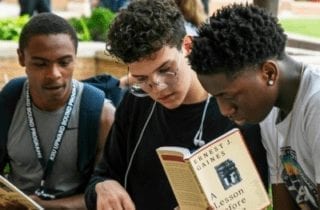Discuss the challenges of digital equity in rural schools and systems. Each rural context presents different challenges and opportunities.
A critical topic for schools, communities, and most importantly, our students, is what teachers do in the classroom to nurture ALL students, create a sense of belonging, and keep educational standards high. Only then can students, especially immigrant students and students of color, meet their potential and succeed in school and beyond. During a recent edWebinar, the presenters underscored that when schools make generalizations about particular student populations and their behavior, they strip them of their individuality, and these students become “invisible.”
This edWebinar will help you understand more about what equitable access in reading means for students that have reading deficits, and how it can help you close the achievement gap.
This edWebinar will provide insights and learning on how a school district with a diverse population of students created systematic change and redesigned their services and supports to meet the needs of their struggling readers and to ensure equitable access for all.
Please join Michelle Luhtala as she interviews Mary about how this consortium is promoting equity and access throughout her state and how it can benefit school libraries elsewhere.
Attendees will learn more about the how and why of developing an equitable literacy framework, the power of access to diverse stories, and how providing students with the historical context to understand how those stories connects them to the world around them.
The edWebinar will highlight how individual steps can be taken towards finding agency, racial identity validation, and community.
This edWebinar will discuss the trends and challenges facing the field of education technology and its impacts on inclusion and for students with disabilities including autism.
In this edWebinar, three superintendents share the strategies they are implementing in their school districts to address digital access inequities.
Learn to engage young citizens in STEAM, and how to remain relevant, by making learning authentic and fully immersed in the backdrop of the global context.










